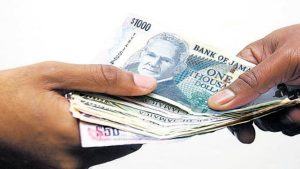 The Opposition People’s National Party (PNP) is now reeling from damaging allegations of misuse of campaign donations by some of its candidates in the February 25, 2016 General Election.
The Opposition People’s National Party (PNP) is now reeling from damaging allegations of misuse of campaign donations by some of its candidates in the February 25, 2016 General Election.
The allegations were made by PNP Treasurer Norman Horne in his report to the party’s National Executive Council (NEC) meeting on July 23 and 24, but which only surfaced publicly yesterday.
In his report, Horne painted a picture of a party in campaign disarray that spilled over to its ability to raise funds for the election that it eventually lost by one seat to the Jamaica Labour Party.
“Throughout the 2016 national campaign the treasury worked assiduously to overcome the handicap the party endured due to the fragmentation of the political leadership, machinery and consequently the national campaign itself, which resulted in multiple non-cohesive and disjointed campaigns being run by distinct groupings and individual members of the party,” Horne wrote.
He said that prior to February 17, 2016, when the party communicated its decision not to participate in three planned national debates, the treasury’s greatest competition in the marketplace was the membership of the party who held senior positions in Government.
“These persons were actively in the market for what seemed to be sole benefit of their personal campaigns and collected significant amounts from members of the private sector who were earmarked by the treasury as potential substantial donors for the benefit of the PNP as one cohesive unit,” he wrote.
“On numerous occasions, information received by the treasury from the potential donors was that contributions had already been made to senior party members for the benefit of the party. However, only a few members reported or accounted in full, or even in part, for the receipt of these donations to the treasury or the party executive.
This heavily affected the party’s income and short-changed the party, resulting in a negative effect on the national campaign. Financially speaking, there was not one central bank, but several banks; some of which had more resources than the treasury,” Horne stated.
“Necessary funding could have been strategically diverted to marginal constituencies, which seemed to have required just a little more financial support to get them over the hump. Had there been a cohesively executed campaign, with the treasury being the central bank and the recipient of the bulk of the resources, then it is highly likely that we would have won the election and been in Government today,” he argued.
Since the election loss, the PNP has been in turmoil with calls for changes to the leadership, particularly that of President Portia Simpson Miller. Initially, former General Secretary Peter Bunting had hinted that he would challenge Simpson Miller. However, he eventually walked back that position.
Last month, former Cabinet minister and PNP vice-president Dr Karl Blythe submitted his nomination for the presidency for which delegates will vote at the party’s annual conference in September.
“I truly believe that my party needs to start the renewal process, and I believe that this renewal process would have started if other persons had entered the race,” Blythe, a medical doctor, told the
Jamaica Observer.
“If I am voted in as leader at this time, I will become the initiator of the renewal process, and I will give the party one year to put in place the person that they believe is best suited to take the party through the renewal process,” Blythe added.
Horne, in his report, also called for renewal in the party, stating that the PNP’s former president, PJ Patterson, had stated that it is now time for “Norman Washington Manley’s party to rebuild, repair and reignite the sparks of change”.
Manley was a co-founder and first president of the PNP in 1938. Horne said that it was no secret that before the PNP’s final decision not to debate, the JLP was having grave difficulty raising funds from the business community.
“At that time, the private sector was merely being asked by the JLP to make campaign contributions so as to ensure that they could ‘maintain a strong Opposition’. The sentiment within both parties was that the JLP could not and would not win the national election and therefore was not a viable investment.
However, a day in politics is a lifetime, and in living proof of the adage, our failure to debate had irreversible consequences for not only the treasury but the party at large,” Horne said.
He said that immediately, in rejection of the PNP’s stance, the majority of the private sector refused to make any further contributions to the party. Instead, the sector decided – based on the perception that the PNP was displaying arrogance and a sense of supremacy – that the party had denied the electorate the right to participate in democracy through the communicative avenue of debating.
Horne also told the NEC that, since the general election defeat, the PNP’s financial forecast and indicators from the testing of the donor market have gradually and consistently worsened.
“Consequently, there is a mounting objective concern that we will not be able to meet our budgetary target, with regard to the local government elections,” he stated, and called on all Comrades who collected funds from private sector and others entities, to make a full, transparent, and confidential accounting of all of the funds received to the treasury and the officers of the party by July 29, 2016.
